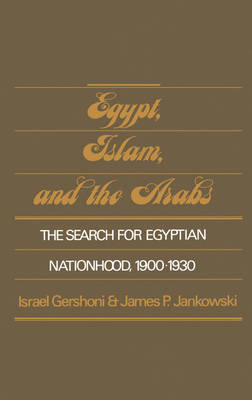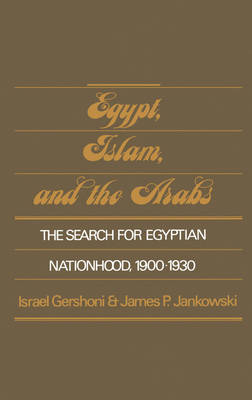
- Afhalen na 1 uur in een winkel met voorraad
- Gratis thuislevering in België vanaf € 30
- Ruim aanbod met 7 miljoen producten
- Afhalen na 1 uur in een winkel met voorraad
- Gratis thuislevering in België vanaf € 30
- Ruim aanbod met 7 miljoen producten
Zoeken
Egypt, Islam, and the Arabs
The Search for Egyptian Nationhood, 1900-1930
Israel Gershoni, James Jankowski
€ 398,95
+ 797 punten
Omschrijving
Throughout the 20th century, Egyptian nationalism has alternately revolved around three primary axes: a local Egyptian territorial nationalism, a sense of Arab ethnic-linguistic nationalism, and an identification with the wider Muslim community. This detailed study is devoted to the first major phase in the perennial debate over nationalism in modern Egypt--the territorial nationalism dominant in Egypt in the early 20th century. The first section of the book examines the effects of World War I and its aftermath, which temporarily gave rise to an exclusively Egyptianist national orientation in Egypt. Subsequent sections consider the intellectual and political dimensions of Egyptian interwar years. Egypt, Islam and the Arabs is the first volume in a new Oxford series, Studies in Middle Eastern History. The General Editors of the series are Bernard Lewis of Princeton University, Itamar Rabinovich of Tel Aviv University, and Roger M. Savory of the University of Toronto.
Specificaties
Betrokkenen
- Auteur(s):
- Uitgeverij:
Inhoud
- Aantal bladzijden:
- 364
- Taal:
- Engels
- Reeks:
Eigenschappen
- Productcode (EAN):
- 9780195040968
- Verschijningsdatum:
- 29/01/1987
- Uitvoering:
- Hardcover
- Formaat:
- Genaaid
- Afmetingen:
- 159 mm x 236 mm
- Gewicht:
- 739 g

Alleen bij Standaard Boekhandel
+ 797 punten op je klantenkaart van Standaard Boekhandel
Beoordelingen
We publiceren alleen reviews die voldoen aan de voorwaarden voor reviews. Bekijk onze voorwaarden voor reviews.







